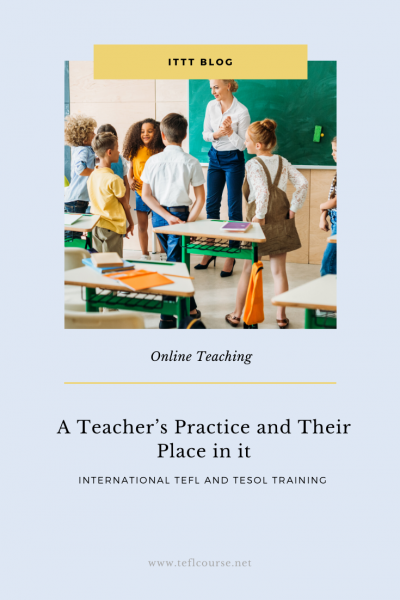A Teacher’s Practice and Their Place in it

We have many teachers throughout our lives and in very differing forms. For example, our very first teachers are ourselves, as we learn to grow through nature and get stronger. Our next teachers are our parents, family, and friends who essentially teach us how to communicate with others, right from wrong (if we are lucky!), and how to navigate our way through life. We also have our more formal education in the form of Nursery or Kindergarten, Primary, Secondary and Further Education such as College or University.
Teachers are a huge part of our lives and therefore it is a huge privilege, responsibility, and commitment for a person to take on the role of a teacher. Throughout your career as a teacher, you will be many things to many students. However, there are six main attributes that I feel are important for a teacher to possess to be able to guide students through their learning journey which are professional, approachable, knowledgeable, open-minded, communicator and consistent. Here are six of the attributes headed below, which I will discuss in more detail.
This post was written by our TEFL certification graduate Smaranda E. Please note that this blog post might not necessarily represent the beliefs or opinions of ITTT.
Professional
The teacher must remain professional at all times and this encompasses many different areas and is something that only the individual had the power to maintain and this is mostly about holding oneself accountable and responsible. The teacher must show professionalism towards their colleagues, towards their organization and respect towards the students. Whether the students are adults or young learners, everyone is entitled to be treated with a professional level of respect. It is important for individuals to maintain personal development up to date and to ensure that they are organized and resourceful when it comes to arriving at lessons on time, having planned lessons of good quality which have been well thought through and with suitable content for the students in their class. Lessons need to be delivered accurately and concisely with the student's needs to put first and providing sufficient materials and resources to make the lessons more meaningful to the students. Teachers should always keep up to date with marking, assessment, and reporting and have documentation to back this up. It is the role of the teacher to provide a safe and comfortable learning environment for the students and this can be achieved through making sure that the classroom space is bright and interesting, or simply that there are enough chairs and desks for the students to sit on!

Also Read: How can developmental psycholinguistic research help foreign English students?
Approachable
The teacher must be approachable for many reasons. There may be occasions when students are feeling confused, stressed, dealing with personal issues that can inevitably affect their learning or they may simply be lacking in confidence in a certain area of their learning which they need support with. In these situations, this can mean the difference between students passing or failing! The teacher can help in this area by being positive, enthusiastic, friendly and fun (where possible!) The teacher must get to know a little bit about the students so that they can establish a relationship where the student can come to the teacher if they are experiencing problems and feel that they have support. A good teacher can get the balance right between being a friend and coach while remaining professional at all times. This will get the best results for everyone!
Knowledgeable
This criterion is rather obvious, as a teacher is there essentially to teach the students and impart their knowledge. It is therefore essential that the teacher ensures that they are up to date with current standards of teaching practices, research the areas they will be teaching to provide relative and interesting ways of delivering lessons, to be a risk-taker and now be afraid to think outside the box and try something new! You must be confident in the subject content you are teaching to the class and you know what you are doing through lesson planning and activities provided for students. Students will pick up on any lack of confidence or lack of knowledge and this may hurt the class. However, it is also important to remember that we are all human and that if we do not know the answer to a question, that we say we will find out rather than pretending we know and providing misinformation for obvious reasons. Having basic knowledge of the cultural backgrounds of some of your students will go a long way in helping to bridge gaps and promote trust and respect. Professional development is a key essential as it ensures that the teacher is also an active learner!

Also Read: How long does a TEFL course take?
Open-minded
This leads me to the importance of being open-minded and respectful towards students at all times. A great teacher will ensure that they are not judgmental when it comes to the differences of some of the cultures or backgrounds of different students in their class, but will instead as mentioned in the previous details, get to know about the student’s cultures, languages (mother-tongue), backgrounds etc and bring those into discussions and activities within the classroom. This will not only help to bring the group together and create a friendly and relaxed environment for learning but will also inspire students to learn and enhance their learning experiences.
Communicator
being a good communicator is essential to this role. How we speak to other people and listen to other people is definitive in building strong, positive and effective relationships with other people and is vital to the role of being a good teacher.
Also Read: 7 Awesome Ideas for Business English Classes
Consistent
It is so important that a teacher shows consistency. This could be in their attitude towards students in their class or to their colleagues, or simply to their responses to the students within the class when it comes to expectations and behavior management. This can be achieved most effectively through Class Agreements which can be done during the first or second lesson to establish rules, which come from both the student’s and the teacher’s input and can be referred to throughout the year or the course. It can relate to something like how the students and teacher should speak to one another, to what the expectations are with regards to homework or handing in assignments within the class. It doesn’t matter what form it takes, consistency is the key to running a respectful, happy, positive and successful learning environment.
Do you want to teach English abroad? Take a TEFL course!
These are only six of the attributes I feel are important for a teacher to possess, and I am certain that they will differ from teacher to teacher, and this is healthy! There are many, many more positive attributes a teacher may posses, but for me, these are the things I know that I will always strive and continue to maintain throughout my career as a teacher.
Apply now & get certified to teach english abroad!
Speak with an ITTT advisor today to put together your personal plan for teaching English abroad.
Send us an email or call us toll-free at 1-800-490-0531 to speak with an ITTT advisor today.
Related Articles:
- The 5 Best Ways To Build Rapport With Your TEFL Students
- The Benefits of Having Good Rapport with Students
- The 10 Best Destinations for Teaching English Abroad in 2018
- 5 Great Places to Teach English Abroad Without a Degree
- The Top 5 TEFL Destinations For Adrenaline Junkies and Adventure Seekers
- Online or In-Class - Which TEFL Course Should You Take?




